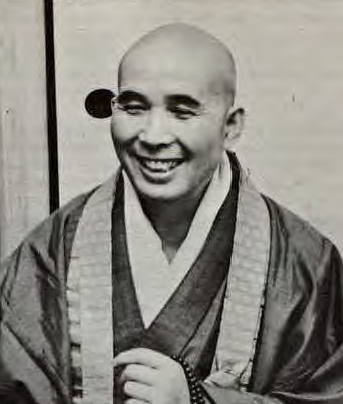ZEN MESTEREK ZEN MASTERS
« Zen főoldal
« vissza a Terebess Online nyitólapjára

小田雪窓 Oda Sessō (1901-1966)
http://en.wikipedia.org/wiki/Oda_Sess%C5%8D
GARY SNYDER asked his teacher Oda Sesso Roshi, "Sometimes I write poetry, is that all right?" Oda laughed and said, "It's all right as long as it comes out of your true self." He also said, "You know, poets have to play a lot, asobi." The word asobi has the implication of wandering the bars and pleasure quarters. For a few years while doing Zen practice around Kyoto, Snyder quit writing poetry. It didn't bother him. His thought was, Zen is serious, poetry is not serious. In 1966, just before Oda Roshi died, he spoke with him in the hospital. He said, "Roshi! So it's Zen is serious, poetry is not serious." Oda replied "No, no, poetry is serious! Zen is not serious."
From a tape by Gary Snyder
Wind Bell, Fall 1969, Vol. VIII, Nos. 1-2. p. 27.Oda Roshi, the Dharma heir of Goto Roshi, became Kancho
and also Roshi of the monastery of Daitoku-ji, Goto Roshi said to him,
'You should be open to foreigners,' and so Daitoku-ji became the orthodox
Rinzai temple that was open to foreigners as none of the others ever were
really and aren't today. Foreigners could come and sit in the monastery and
then if they were still around after a year and bad learned Japanese, they
might be accepted as disciples of Oda Roshi.
My teacher was Oda Roshi, and I studied with him up until he died in
September, 1966. He was originally from a poor farming family in Tottori
Prefecture, given to a Zen temple at the age of ten. He was in the Myoshin-ji
Sodo for a while and later in Korea with Goto Roshi. I was his first foreign
student, I think, and then a young Dutchman named Jan Willem van der
Wettering was there for almost a year; a man from Jerusalem named Zef
ben Shahar and a Guatemalan named Ernesto Falla were his disciples for
a while; Irmgard Schloegal was there from 1960 on; and there were a few
other people who came and went.
Oda Roshi was the subtlest and most perceptive man I've ever met. He
didn't display his power openly but appeared mild and silent. Yet his
sanzen was a true reading. and leading of the student's mind- often with
no words. His teisho were inaudible, his voice was so soft. Yet as one of the
present head monks of the Daitoku-ji Sodo said to me recently, "Those
lectures of Oda Roshi we couldn't hear I am beginning to hear today."
"I would take this all the way back down to what it means to get inside your belly and cross your legs and sit -- to sit down on the ground of your mind, of your original nature, your place, your people's history. Right Action, then, means sweeping the garden. To quote my teacher Oda Sesso: 'In Zen there are only two things: you sit, and you sweep the garden. It doesn't matter how big the garden is.' That is not a new discovery; it's what people have been trying to do for a long time."
(from an interview of Gary Snyder by Peter Barry Chowka; East West Journal, June 1977)
Oda Sessō's Dharma Lineage
[…]
白隱慧鶴 Hakuin Ekaku (1686-1769)
峨山慈棹 Gasan Jitō (1727-1797)
隱山惟琰 Inzan Ien (1751-1814)
太元孜元 Taigen Shigen (1768-1837)
儀山善來 Gisan Zenrai (1802-1878)
洪川宗温 Kōsen Sōon (1816-1892) [今北 Imakita]
洪岳宗演 Kōgaku Sōen (1859-1919) [釋 / 釈 Shaku]
輟翁宗活 Tetsuō Sōkatsu (1870-1954) [釋 / 釈 Shaku]
瑞巌宗碩 Zuigan Sōseki (1879-1965) [後藤 Gotō]
小田雪窓 Oda Sessō (1901-1966)